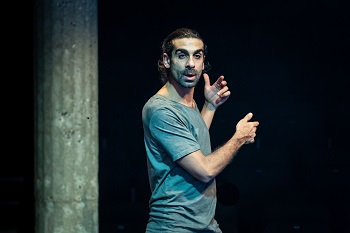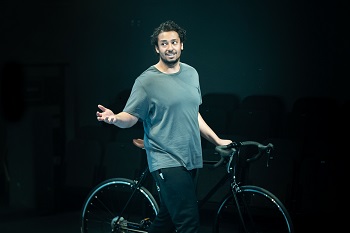Where Do You Feel You Most Most Belong?
Liz Vercoe says that's the question asked by the Bush Theatre's excellent new play

Irfan Shamji as Samad (left) and Scott Karim as Tom. Pictures by Marc Brenner
Are we really people of the world? Or is the place we belong our country? But any online-obtainable ancestry test will soon reveal we are all from many countries, so which one?
So perhaps it's the community where we are born? Then again, plenty of people have moved on for jobs or interest or education and no longer feel they fit in there at all.
What about the street where you've ended up? Hmm, there will be people who have lived there far longer than you, unwittingly laying an invisible claim to being more part of its fabric than a relative newbie.
So where? Maybe the truth is, rather than it being our "world", we are only entitled to feel we belong "inside our own front door". Not a big space relatively. Yet trouble invariably comes when people seek a bigger chunk to call their own.
This play. written and directed by Bijan Sheibani stirs up all these thoughts by taking a forensic look at the effects of a straightforward, and on-the-surface successful, adoption.

Tom (Scott Karim), who was adopted at birth by a loving couple, has been tempted to seek out his birth parents, who remain married. He discovers his younger brother Samad (Irfan Shamji), who was brought up in the bosom of his original family, now lives close by. Their reactions to discovering each other are the basis of this production.
We first meet Tom and Samad as they excitedly explore ways in which they are the same, taking joy in finding unlikely similarities and being made uncomfortable by differences, especially those down to parental choice. All in all, forging what looks like a brotherly relationship.
The set, designed by Samal Black, is an ocean-blue circle
that revolves almost constantly, surrounded by four quietly watchful ancient pillars. This unstable stage rather cleverly both contains them, while also threatening to fling them apart. The pillars seem to echo the significance of the past to humans.
Smartly, Sheibani's play avoids the cliché of poor adoptee v wealthy retainee, for both of his young men have turned out to be well-educated, bright, and forging good careers. Hey, Tom even has air miles to splurge and Samad's holidayed in New Orleans. They both seem honest and likeable.
Yes, Tom has a harder edge than soft-centred and often tongue-tied Samad but aren't siblings often different? And anyway, Tom went to a tough inner-city school while Samad was state-aided through the private system.
What Scott Karim cleverly encompasses in Tom is his love of his adoptive family and contentment with his upbringing but also his hurry to catch up on lost years and the lost relationships with his birth family, the people who genetically make him who he is.

In his enthusiasm, he sees no hindrance ahead. To him they could all become one gloriously extended strands of his life. In Samad, Irfan Shamji successfully balances this by portraying the transformation from initial excitement and curiosity about Tom, his new big brother, to an unarticulated fear of the change that could be wrought to "his" family by the invasion of this stranger.
It could make him seem heartless if he wasn't so well-intentioned and there are, largely unexplored, hints that his own childhood wasn't a bowl of cherries. To watch his clumsy (and so familiar a tactic in real life) retreat from Tom, as the least painful option for both of them, is truly heart breaking to observe, especially ramped up by emotion-grabbing music selected by sound designer Gareth Fry.
It makes you feel deeply for all those brave adoptees who take a look at their birth certificates and decide to make the perilous journey to find out more about their genetic parents and risk the hurt felt here by otherwise tough Tom.
But what make this more than an adoption
and rejection story has to be the context of multi-culturalism, multi-racialism and people the world over having to move from where they traditionally "belong" in order to adopt and hopefully be adopted by somewhere new. We all long to "belong" but the ingredients of what that traditionally means may no longer exist.
By the conclusion, when Samad better understands what it means to feel alone, we maybe have more insight and empathy both for those who seek to get us to join a bigger but unknown group as well as those who build defences and plug the cracks against their life's experience somehow being diminished or diluted.
In just 70 minutes that are definitely worth the trip.
The Arrival runs until 18 January 2020. Tickets from the Box Office on 020 8743 5050 or online.
December 2, 2019
Related links
|